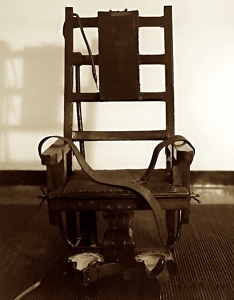One Mississippi, Two
I can’t forget my client’s final phone call
Thirty-six hours after my client was executed, I drove along the highway in the direction opposite the prison for my wisdom teeth extraction. The throb ballooning at the back of my gums had become a rhythmic, welcome distraction from the grief scratching my throat ragged. I ground my back teeth together as I looked out the window, drowning out my client’s final phone call with the pain searing through my jaw.
 It would be my first time going under anesthesia, my first time getting an IV. Needles dangling from pliant tubes were how they usually killed the men whose cases I investigated. At the prison, you can’t see where the IV lines end. They trail through the execution chamber to a darkened room where someone presses a button and starts the flow of poison disguised as medicine.
It would be my first time going under anesthesia, my first time getting an IV. Needles dangling from pliant tubes were how they usually killed the men whose cases I investigated. At the prison, you can’t see where the IV lines end. They trail through the execution chamber to a darkened room where someone presses a button and starts the flow of poison disguised as medicine.
No physicians were involved in the making of this horror film.
My client opted to die in the electric chair. Too many botched injections, stories of gasping and heaving for minutes. Five, 10. Sometimes 20. The shock of electrocution is fast — seconds, only. No one knows for sure how long it takes, but they say consciousness is gone within 10 Mississippis.
***
I was the only 20-something-year-old in a waiting room full of groggy high schoolers. I’d always had dental delays; I lost my last baby tooth just a few months after I started eighth grade. The staff fussed over how young I looked, with my hair flopping over to one side of my head in a knotted pile. What a sweet little thing.
Once my nurse had recovered from the radiant youth of my sleep-circled eyes and wrinkled sweatpants, she asked what I did for work. I’m in the legal system, I told her as she swabbed the inside of my elbow with the minty sting of an alcohol wipe.
Her blue eyes widened. “Do you work with criminals?” she asked, and I paused for one Mississippi before I said that I did.
Physicians didn’t come up with lethal injection, and they didn’t create the electric chair, either. But do you know who did? A dentist. It may not have been the best publicity move for an industry already plagued by phobia, but Dr. Southwick, DDS, felt he was doing something good for the world.
Here is how the story goes. Dr. Southwick, DDS, heard about a drunk man who stumbled into an electric generator. He died in a single Mississippi. Mr. Southwick thought to himself, well. This could be a better way to kill those criminals we usually hang. The ropes are sometimes unreliable.
“Did you know that criminal they killed on Thursday?” my nurse asked me.
I did know him. I knew how his glasses fogged up when he chuckled at the similarity my name has to Sophia Loren’s, even though, he assured me, I looked nothing like her. I knew how his memory sputtered in and out like a faulty power line, ever since his mother swung his toddler head into the kitchen wall. I knew he was remorseful for what he did — or rather, what he didn’t do, which was stop his teenage codefendant from knocking on the door of the girl who hadn’t wanted to go out with him and doing what he did next. I knew he prayed about that and a lot of other things.
I didn’t tell the nurse any of that, though. I don’t remember whether I even said that I knew him, because she’d already instructed me to start counting backwards from 10 and I only got to 7-Mississippi before the nothingness came. I remember waiting for it to hurt, but I didn’t feel a thing after the needle bit into my arm.
Dr. Southwick built a chair because he was a dentist. Chairs made his work easier: patients tilted up with mouths wide open, full of metal prods and gummy fingers.
***
When I woke up, I wasn’t sitting in the vinyl-wrapped chair where the fluorescent bulbs of the operating room had shifted suddenly to blackness. I woke up standing, clutching the edge of a Formica sink and trying to maintain my balance on the tile floor that rolled beneath me. I gagged on the metallic cotton stuffing my mouth.
You’re ready to go, the nurses said. I wobbled from the counter to the nurses’ outstretched arms, ready to steer me down the hallway and into the passenger seat of my friend’s waiting car. My head wobbled as they strapped the seatbelt over my lap.
***
I spent the next few days hovering somewhere between my bones and my skin, throwing up the insides of my stomach through a mouth pockmarked with dribbling bits of pink. It’s the painkillers, I thought. I started with the too-big bottle of narcotics they’d prescribed, but the first time they made me feel fuzzy and buttery, I stopped. I downed maximum doses of Tylenol instead.
I don’t think I was so sick just from the painkillers and the holes where my teeth used to be, though. I think it was also from learning that the pastor had refused to preside over my client’s funeral when he found out he was a murderer. I think it was hearing that they had an open-casket service for him and wondering if you could see any charred skin. I hoped they’d dressed him in his favorite pair of orange Tennessee suspenders.
Since I couldn’t go to the service, I watched the press conference from after the execution over and over, mixed in with baking shows about food I couldn’t eat and old episodes of Arrested Development. I puckered an ice cube between my swollen cheeks like a lemon as I watched the media witnesses describe my client’s last few Mississippis. Each reporter approached the microphone, voice flat, to explain the minute-by-minute procedure as if they hadn’t just watched a man be electrocuted.
As if they hadn’t just watched my client, moments from death, pause in between the lines of scripture he’d practiced with us to say as his last words. He had started to weep.
During his last words to the world, he sobbed, but during his last words to me, he found a way to laugh. Ten minutes before they strapped him to that chair, dressed all in white like he was wearing surgical scrubs, he called our team. We had gathered at the office in case any 11th-hour legal issues arose, but mostly because nobody knew what to do with themselves. It seemed like something to be together. We all jolted in our conference room chairs when the phone rang.
His familiar mountain drawl echoed through the speaker phone. After he asked how we were all holding up, he said he wanted to tell a few of his favorite jokes. “What do you call cheese that isn’t yours?” he asked.
***
After my surgery, I threw up for days and couldn’t eat anything but applesauce and pudding for a week. But when the constant thud pulsing behind my stitches started to dull and I began to fantasize about enjoying food again, I remembered what the nurses and surgeon had told me: Don’t eat anything hard and crunchy.
I ignored them and went straight for the punchline, like the man who created humor in the darkest of places had taught me. I ordered nachos.

Copyright © 2023 by Sophia Laurenzi. All rights reserved. Sophia Laurenzi is a Nashville writer whose work has been published in The Washington Post, Slate, HuffPost, and more. She worked as an investigator representing people on death row in Tennessee and Louisiana before turning to writing as a way of uncovering truths and creating space for uncertainty. Her book is in progress.


